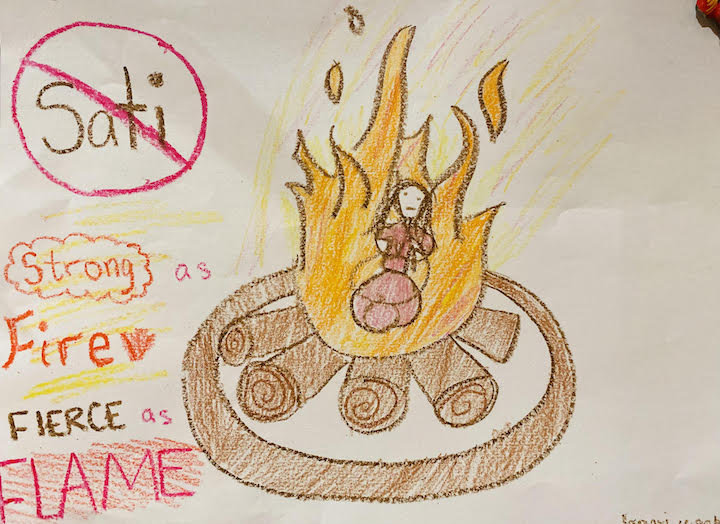
Imagine that we have a time machine and we can travel back in time. Let’s go all the way back to colonial times. How about 1857 in India? This period in history is when the country was ruled by the British colonists. Things would be different than today. Child marriage, young widows, women being outnumbered, no freedom, caste system, poverty, the tradition of ‘Sati,’ and so much more. Well, you must be wondering, what is ‘Sati’? Sati was a tradition practiced by many ancient Indian families. It means when the husband dies, the wife has to sit on the funeral pyre with her husband’s dead body and sacrifice their life. But don’t worry, the practice is over now, as the British government had banned Sati in India during their rule.
To better understand the past, here I have a review of the powerful historical fiction book, Strong as Fire, Fierce as Flame, by Supriya Kelkar. I read this book during my spring break and enjoyed every part of the story.
Meet Meera, a twelve-year-old girl who is turning thirteen in a few days, which means things will be different soon. Meera was married to a boy when she was a little girl. On the eve of her birthday, she will move in with her husband, Krishna. Krishna was like any other boy, who was mean and very arrogant. Before Meera’s move to her husband’s house, she receives devastating news. Krishna was killed in a tragic accident, which meant that Meera won’t have to go to her husband’s house but she was now a widow. Meera didn’t know how to feel or react. She was now a child widow and her father suggests she has to commit sati just like other widows. Meera remembers how her aunt had to be a sati after the death of her husband. But Meera doesn’t want to end her life just because her husband died. Meera then does something that no wife or a daughter should ever do. She runs away from home. While escaping, she meets Bhavani, a girl on her way to a British neighborhood. Bhavani was looking for her sister, Chhaya, who worked as an ‘ayah’ for the British children. An ayah is just like a nanny who lives with the child and helps raise them. When the girls head there, they work for the British masters. There they secretly joined the revolutionaries who were fighting for freedom from British rule. During this stay, Meera makes new friends and turns into a courageous girl. What will happen to Meera? How is she going to help the freedom fighters? Will Meera get caught? Will she be forced to become Sati? Well, to learn more about Meera and her life, please read this book.
There are many reasons for loving this book. Firstly, this book highlights important themes like friendship, freedom, team efforts, girl power, courage, and equality. I really liked how Meera stood against the bad hurdles in her life like Sati, child marriage, and the British rule controlling her life. The most important aspect of this book is the lesson of women’s empowerment. This book taught me about the history of India in the 1850s, especially the bravery of the queen of Jhansi who fought for the country against British rule. I was touched to learn that she didn’t become sati after her husband died and moved on to fight for freedom with bravery and was killed in battle. This book also talked about how child marriage is not okay and how Sati isn’t a good thing. The author also discusses how Indians were mistreated by the colonists. I would not have known these things if I had not read this book. I was very influenced by the strong character of Meera, especially as she transforms into a courageous and fearless strong girl by the end of the story.
Reading this book, I felt like I was transported to colonial times in India. The last thing that I like about this book is the easy language that makes this complex issue easy to understand.
Off note, this story reminded me of the book The Secret Garden by Frances Hodgson Burnett. Based on characters in Colonial India.
So, I recommend this book to all middle-grade readers who want to learn more about history. You can buy this book on Amazon, or borrow it from a library.
I end this blog with some powerful lines narrated by Meera.
“Because I wasn’t someone’s property. I wasn’t a beast of burden, and I wasn’t a pet. I was a girl. Not a queen or a poet. I was just a girl named Meera and I was strong”.

Beautifully explained 😊thank you for the summery 👍🏻👏🏻
Thanks Janavi ~
Great review! I am intrigued. I have the book on hold at the Public library.